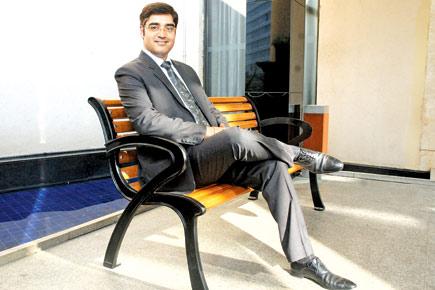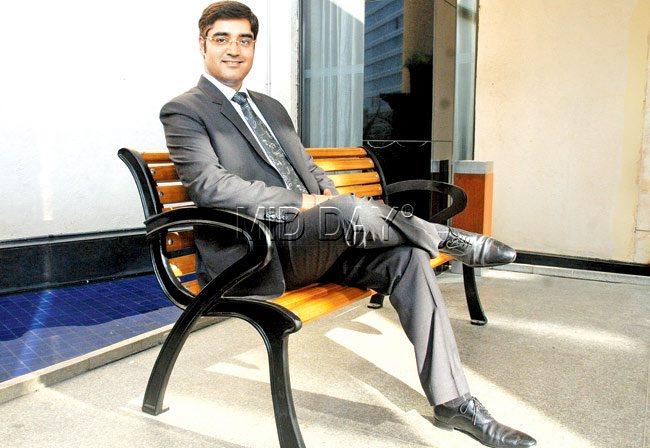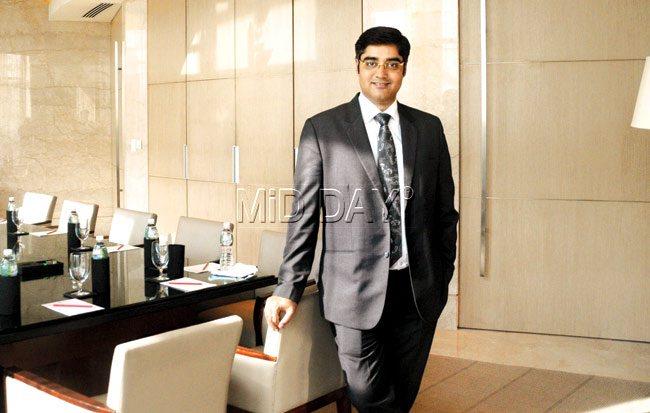Manish Sharma shares with us the 'filmi' story of how he got his first job, his love for gadgets and antiques and why it is important to strike a balance between technology and personal space

Manish Sharma at Trident
Manish Sharma, MD, Panasonic India & South Asia
ADVERTISEMENT
Manish Sharma's first job lasted exactly two days. Or one, if you consider that he decided to quit the job after his first day at a Dharuhera-based fibre optics cable company. At that point, he was fresh out of college and was looking to marry his girlfriend and settle down.
Manish Sharma at Trident. Pics/Satyajit Desai
"I left the company even before I could complete my joining formalities, so technically, I didn't join the company," smiles Sharma, when we meet him at Bandra Kurla Complex's Trident for a tête-à-tête. But what prompted him to take a decision that would make most fresh graduates shudder? "The moment I joined, I knew the office wasn't the right place for me. I am like that — I go by my instincts," says the top executive.
When love conquered all
This is no exaggeration. During our conversation — which he peppers with anecdotes about living in a brave new India in the '90s — it becomes evident that his heart ruled over two of his life's most crucial decisions. So crucial, that one of them changed the course of his career as it involved him giving up a lifelong ambition of becoming a doctor.
"I did my schooling at Carmel Convent School, Gwalior (a co-ed school back then). I always wanted to become a doctor and my best friend, an engineer. On the day we were supposed to choose our preferred streams in Class 11, my friend sadly remarked that we may not be very close anymore as we will be in separate classes. I instantly told him that I will also choose mathematics instead of biology. A major career decision was made. I didn't even consult my parents," he chuckles.
A similar incident played itself out at Bhilai Institute of Technology in Madhya Pradesh, where Sharma pursued a bachelors in engineering — except this time, he didn't want to part ways with his college sweetheart, whom he went on to marry. "After the first year, we had to choose the field we wanted to specialise in. My first option was civil engineering as my father had started a real estate business and I wanted to join him. My last option was electrical engineering.
But her first option was electrical engineering so I said, 'So what? I will also take electrical engineering'," he laughs. "And you won't believe how much I hated the subject. But I enjoyed it later," adds the corporate man. Sharma credits his parents, who he describes as "liberals", for his ability to think on his feet and not maniacally obsess about his future. "I was born into a middle-class family. My father worked for the Birla group and my mother was a homemaker," says Sharma who, as a school student, was active in academic and extra-curricular activities, including sports and theatre.
Luck by chance
His middle-class upbringing, however, didn't stop Sharma from keeping an eye on — and gradually purchasing — the latest gadgets, even as a young boy. "When I was 10 years old, my uncle returned from the US with this Casio watch which had a calculator and I asked my father for it. Today it only costs R200 at Lajpat Rai market but back then such gadgets were a luxury," he says. "Even now, I have to get my hands on the latest gadgets. I purchased an iPhone 6 weeks before anyone else could get it," he laughs. So he pre-orders his gadgets, we ask. "Pre-order?" he asks, in mock horror. "I order even before the pre-order!"
Manish Sharma
In his college hostel, Sharma was the only one to own a TV — a 14-inch black and white one — out of the 700 odd students. "I remember during the 1992 Cricket World Cup in Australia, when Pakistan won, almost 150 guys queued outside my room to watch the match," he smiles. The early '90s, during India's economic liberalisation, was an interesting time to be a college student. "Fashion, cable and satellite television and automobiles were evolving," he remembers.
Post 1995, after the briefest brush with the fibre optic company, Sharma returned to Gwalior, desperate for a job. "At that time, Malanpur (an industrial town located 10 km outside Gwalior) was booming as big companies such as LG and Cadburys had manufacturing units there. I went knocking on all factories to meet the manager. I sat outside the gate for 15 to 20 days and kept asking the security guard to introduce me to someone from there. One day, LG Hotline's project head asked the guard about me and when the latter informed him that I refused to leave the premises, the manager asked me to come upstairs," he narrates.
"There, I was interviewed by my soon-to-be first boss Rakesh Singh, whose first question was about the Purulia arms drop case," he continues. "Back then, I never used to read newspapers thoroughly. But since I spent so much time waiting outside the gate with nothing else to do, I ended up reading them at the nearby tea shop and knew about the case," he laughs. Sharma was hired by LG Hotline for a greenfield project, which was one of the first major multinational manufacturing projects in India post the relaxation of FDI norms. Successful stints at Samsung and Haier followed later.
'We will invest in startups'
Sharma joined Panasonic in 2008. "In 2009, the brand was looking to re-enter the Indian market. It had a small turnover, few people and many challenges. There was no reason why our trading partners would not opt for someone else when Koreans were leading the market. So I had to focus more on the business, which meant late nights. My family was very supportive," he remembers.
Today, however, Sharma makes sure that work does not spill over his personal space, even in a hyperconnected world. "It is up to you to decide how you want to use technology. I am not on Facebook," he shrugs. "I spend almost half an hour on Twitter in the morning, right after I check my email. Once I reach home, the laptop and tablet remain in the bag, although I do check my emails and respond to them," says the father of two.
When Sharma was promoted to his current role in 2012, the move hit the headlines, as newspapers drew parallels between Panasonic and its competitors such as Samsung and LG where Koreans continued to rule at the upper rung of the company ladder. "As a leader, I wanted people to believe in me. Strategy should be practical and innovation should always be a part of your thought process. Also, I am a people's manager and go beyond professional limitations to talk to people," he explains.
Future goals include consolidating the company's position as "one among the top three brands in the durables industry", among others. "I also plan to focus on providing solutions to two challenges which India faces — the availability of power and security of people and enterprises," he adds.
Citing the Panasonic India and Reliance Communications Ltd (RCOM)'S launch of a cloud based video surveillance service for enterprises on January 23, Sharma adds that he always encourages youngsters at work to take risks. "A young man from my team went to Panasonic UK and learnt about a company called Cameramanager.com, which is into cloud-based analytics. It was created by a UK-based Indian entrepreneur and Panasonic UK had taken it over. He realised its potential and discussed it with me. I encouraged it. And today, we have a collaboration with Reliance Communications Ltd," he says.
The other area Sharma keeps a close tab on is start-ups. "The appetite for risk has increased in the youth. Also, now, much is changing in terms of the availability of resources, funds and an ecosystem conducive to entrepreneurship. People want to invest now and our future plans include investing in start-ups," he explains.
A love for the old and new
A self-confessed travel junkie, Sharma makes sure that he goes on a vacation twice a year with his family. But his real hobby is collecting antiques, albeit of a different kind. "You will be excited when you see my collection of smartphones. Two drawers in my wardrobe are reserved for them. I have all the models of BlackBerry and communicators — I even have more than one copy of a couple of models. When I heard that Nokia was going to stop its production of communicators, I got one more," he says. Other prized collectibles include antique cameras, coins from the Mughal era, a nearly 70-year-old Philips radio and a 35-year-old Panasonic TV. "You have to remember, they might be antiques today, but they were the latest gadgets once," he adds.
Although Sharma admits that he doesn't work out as much as he would like to, he does have a sure shot way to de-stress. "Don't stress at all," says Sharma, who loves reading up on philosophy. "It kills your efficiency. Share your worries with someone like your boss or mentor and it will reduce by 50 per cent. Keep life simple. Don't indulge in anything that can cause stress later. Follow this as a rule and nothing will go wrong," he concludes.
 Subscribe today by clicking the link and stay updated with the latest news!" Click here!
Subscribe today by clicking the link and stay updated with the latest news!" Click here!







